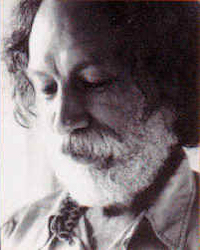Chanting Iron: Volker Heyn
|
Dan Albertson [January 2022.] [For you, J.K., with utmost affection.]
Among the German composers toiling away in the penumbra of the few mainstream names, Volker Heyn stands apart for his uncompromising streak, his independence from the Neue Muzak circle and his aesthetic positions. Born in Karlsruhe in 1938, he initially studied voice, then shifted to Australia to study acting, and meanwhile travelled with a theatre troupe and took odd factory jobs – this latter to prove of immense import on his sonic preoccupations, which tend toward abrasion, confrontation and the poetry of metal. Listenable it always is, though, once the ears are properly braced. In his 30s, he went back to Karlsruhe and studied guitar formally, though he also studied composition. He has never held a formal teaching position, and despite a few ardent international fans, he maintains his isolation in Karlsruhe while continuing to compose unabated. His orchestral score Ferro canto (1989, rev. 1991) provoked an unintended cause célèbre by virtue of its cancellation, not once, but twice, on supposed grounds of unplayability. Whatever factors may have been in play (Michael Gielen was not generally noted for being afraid, though he would obviously wish to save face), the work will finally be unearthed in February 2022 in Stuttgart. An overdue triumph, a validation, a closing of a circle? High time, then, to consider some other weigh-stations in his output, the earliest surviving works of which date from 1979, by which time he was already past 40. The bulk of his pieces date from his 50s, 60s and 70s. Even at 83, with a music-theatre work based on Upton Sinclair in his rearview mirror, Heyn dares, prods and breaks the sound barrier. Ferro canto followed on the heels of tem (1980) and Dükarrahsch Mongkhöhr (1984), the former a study in string flageolets long before Kaija Saariaho made them superfluous, and both occupying extremes of pitch terrain. These orchestral works aside, it is Heyn’s engagement with unconventional ensembles that assures him a place at the front ranks of contemporary composers. Drihmthoyhm (Raumakustischer Alptraum) (1982), for instance, uses a tárogató and a trio of percussionists amid pairs of clarinets, saxophones, French horns, trumpets, and trombones, while the mini-cello concerto K’mon Siggibêybe (1985) uses the Octandre line-up with doublings. The more recent Mashyhn (2010-11) is for contrabass clarinet, saxophone, contrabassoon (or tuba), violin, viola, double bass, piano, and percussion, almost ordinary by his standards yet still characteristically brash with high and low sonorities. Many works employ his beloved guitar, whether bass (Burroughs’ Bellows or Bass Affair), 12-string steel (Cordas, Strings or Reverb, azure #1) or electric (Vermutungen über ein Rotes Haus or WHY NOW). His penchant for loud outdoor-style winds and brass has not hindered his deft treatment of strings in solo and chamber contexts. Consider the early Blues in B-flat (cello, 1981), Sirènes (string quartet, 1983) or Blah 2 (violin and fixed media, 1985) or the later …NTO. (violin, 1995), Les Visages des Enfants (string quartet with or without amplification, 2002-04), 2nd ‘blue’ string quartet (2005), refract (violin, 2016), or trace (viola, 2017): the music need not be dolce, need not be brutale, it can be both. Even the hardest of hearts has a tender side. His catalogue contains other solo works, for accordion, cello, piano, or tuba, and the piano-based performance piece Did yer hear that?, a quirky tribute to mark the centenary of Franz Liszt’s death (1986) is unforgettable. In a similar vein is the happening The Raven (1997-2000), replete with scrap metal and dredging machine. The Upton Sinclair music-theatre work, Transfer, on the slaughterhouses of Chicago, waits in the wings. His ear-splitting 1991 song-cycle Max the Fiddler’s Complaint for mezzo-soprano, two electric guitars, amplified viola, and amplified double bass is a full-frontal, and at times witty, experience to be treasured. There is also a one-act opera Geisterbahn (1989), unknown to me. The surface has only been scratched. Dig deeper, we must. Volker Heyn, for all his brilliance, is a testament to the travails that must be endured to forage and forge forth in (creative) life. Dredge on, dredge on. Long may he flourish.
[More Dan Albertson]
[More
Heyn]
[Previous Article:
Used Bin Troll Tweets EEE.]
[Next Article:
Constructing Absurdities and Monstrosities: Mikel Urquiza]
|
